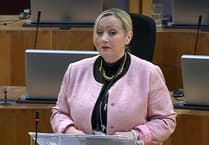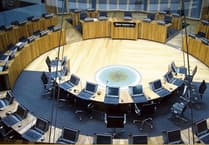MSs scrutinised the first minister and Plaid Cymru’s leader on the cooperation agreement.
Mark Drakeford said the fundamentals of the three-year agreement between the Welsh Government and Plaid Cymru remain intact.
He told a scrutiny committee Labour has long had to work with others because the party has never won a majority in a Senedd election.
He pointed out he has been involved in every deal “in one way or another” since the partnership agreement with the Lib Dems in 2000.
The first minister told MSs the 2021 deal benefits from that experience as he raised the importance of a document on mechanisms for delivering the agreement.
He said policy work on the 46 commitments has progressed and ministers are moving to the implementation phase of the three-year programme.
‘Marriage counsellors’
He told members: “We’re not marriage guidance counsellors so I can’t promise that people don’t occasionally take a different view … but the fact that we have got a way of resolving those issues, I think has worked really well.”
Labour’s David Rees questioned whether the 2021 budget deal is taking priority over, and funding away from, other aspects of the Welsh Government’s programme.
The first minister said money for the cooperation agreement is ring-fenced.
Rhun ap Iorwerth stressed that cooperation agreement commitments make up a relatively small percentage of the Welsh Government’s £20bn budget.
Prof Drakeford said part of the agreement is that Plaid Cymru has an opportunity to influence the wider budget beyond the 46 commitments.
‘Scarily high’
Labour’s John Griffiths asked about a commitment to end homelessness amid concerns about the housing support grant being frozen at £167m
Prof Drakeford replied: “Yes, it is frozen at that level but that level is considerably higher than it was the year before.”
He said a white paper on ending homelessness includes ambitious policy proposals.
Warning that the number of homeless people is “scarily high”, Prof Drakeford stressed the importance of increasing the supply of housing.
‘Richer’
Russell George, for the Conservatives, highlighted that 78% of respondents to a consultation on a tourism tax disagreed with councils having discretionary powers.
Mr Iorwerth told the committee that communities will benefit from the levy, arguing that the experiences of visitors and the industry will be richer as a result.
The Plaid Cymru leader said guidance on the tax will be introduced before the end of 2024.
Asked about the 182-day self-catering holiday let threshold, Prof Drakeford said engagement with the sector continues and the Welsh Government has already agreed some exemptions.
Mark Isherwood, for the Tories, asked about a joint paper on priorities for the next budget.
Mr Iorwerth pointed to an increase in the Education Maintenance Allowance and the extension of the bus emergency scheme.
Pressed about a disagreement on providing free school meals during holidays, the Plaid Cymru politician stressed that it lies outside the cooperation agreement.
‘Maturity’
Plaid Cymru’s Llyr Gruffydd asked about plans for a national care service.
Mr Iorwerth said politicians are often accused of short-termism but the proposals show maturity and a commitment to work together to deliver a long-term vision.
During the scrutiny session on Friday December 8, he told MSs that an action plan will soon be published – mapping out first steps in establishing a national care service.
He warned that the financial climate has changed significantly, particularly following the UK Government’s decision to cancel plans for a health and social care levy.
Asked about a decision on creating a shadow broadcasting authority, Mr Iorwerth said there is agreement that Wales needs to move towards the devolution of broadcasting.
Senedd reform
Pressed about concerns surrounding plans to reform the Senedd, Prof Drakeford stressed that the changes will require a supermajority of two-thirds support from MSs.
He said: “Reform is a package deal, it isn’t just a series of unconnected individual strands.
“What we will need to look at in any proposals for change is not just how that particular idea might alter Senedd reform – but how any change would impact the whole package.”
He said compromise is the only way of achieving change: “If anybody thinks they’re going to get everything exactly as they would prefer it, they’re going to be disappointed.”
Mr Iorwerth agreed, saying Wales is democratically short changed and “it’s time we put that right with a Senedd that can meet aspirations”.




